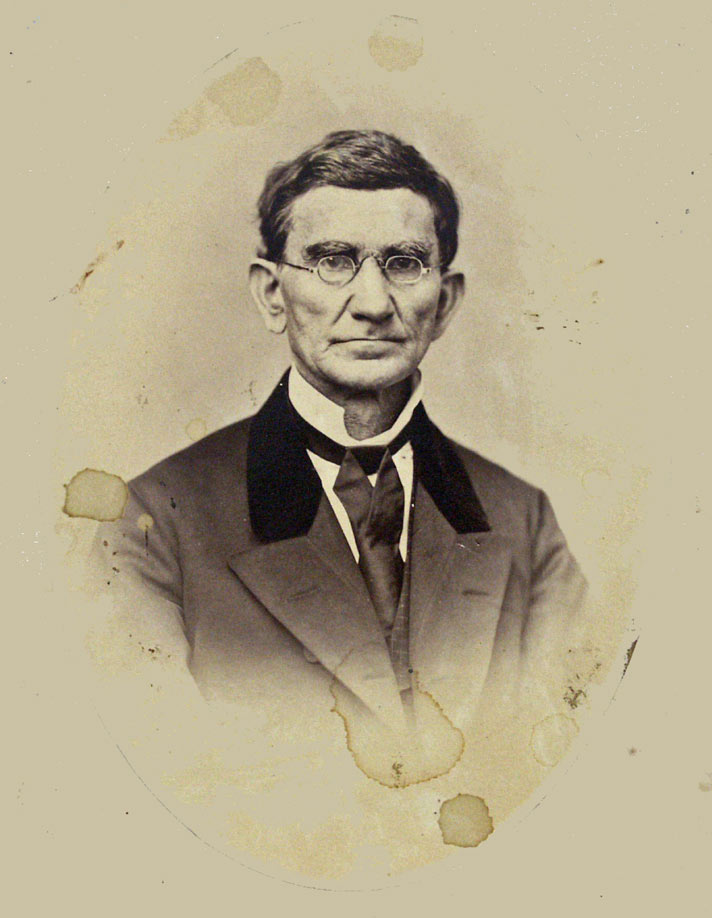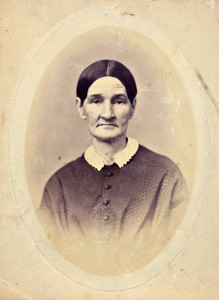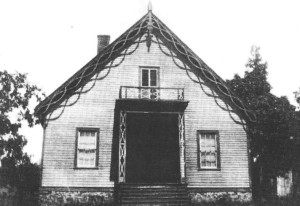Pioneer Profiles – February 2016
When William Hoffman arrived in Jacksonville in the fall of 1853, he brought his own gold—six marriageable daughters, a treasure indeed to the many bachelors who had been lured to the Rogue Valley by its promised riches of mining and free land. Unlike these young adventurers, Hoffman was not a fortune seeker. He was 51 and already well established in business, politics, and community when he left it all behind in Indiana and brought his family on the arduous six-month journey across the Oregon Trail.
Hoffman had been born in Baltimore, Maryland, in 1801 to a family of German heritage, so spoke both German and English. When he turned 13, he started making his own way in the world, beginning his business life as a clerk in a mercantile establishment. Two years later, Hoffman opened his own store in partnership with a cousin.
Opportunity took Hoffman to the Ohio frontier, and at age 20 he became business manager of, and then partner in, a large mercantile business in Cincinnati. However, in 1824, at the behest of family members, he returned to Maryland. Following the deaths of his parents, Hoffman had few remaining East Coast ties. He again moved west, opening his own store in 1835 in Fountain County, Indiana. A year later, he returned to Maryland long enough to marry Caroline Shafer, the daughter of another German American family. She proved to be a good match for him in background, temperament, and aspirations.
Hoffman prospered in Indiana, becoming prominent in business, church, and politics. In 1840, he was elected County Recorder, an office he held for the next 12 years.
However, by 1853, Caroline was suffering from severe asthma. Her brother-in-law, Dr. Henry McKinnell, recommended a change of scene—the far west. So in April of that year, Hoffman packed up his family and headed for Oregon. Their party consisted of William and Caroline, their six daughters, Hoffman’s two unmarried sisters, his married sister and her husband Dr. McKinnell, and seven hired hands. There were five wagons, nine yoke of oxen, seven cows, a heavy carriage for the Hoffman family, and four horses. En route, several more families joined them, and for a period of time they traveled with a “Missionary Train” of Methodist-Episcopal ministers.
Hoffman’s trip diary emphasizes a continuous search for food and water for the livestock and game and firewood for the travelers, but his biggest complaint was the “clouds of mosquitoes” that followed them. On October 31—Halloween—the Hoffman wagon train reached Jacksonville.
The Hoffmans and McKinnells initially settled into a log cabin near Phoenix, Oregon. It was undoubtedly crowded but made more habitable by placing two of their wagons next to the cabin to be used as additional bedrooms. All six daughters slept in the attic, reached by a ladder.
Hoffman and McKinnell tried their hands at farming, an occupation for which they were ill-equipped. Two years later, after losing thousands of dollars, McKinnell moved to Portland where he established a successful medical practice.
Hoffman was elected County Auditor under the Territorial Government and Justice of the Peace, and moved his family to Jacksonville. Their initial “town house” was a small, hastily-built cabin on North Oregon Street where the TouVelle House now stands.
When Oregon achieved statehood in 1859, Hoffman became the first elected Clerk of Jackson County and served for six years. In that year he was also appointed a U.S. Commissioner. A year later, Hoffman became the first president of the Jacksonville Board of Trustees and served as trustee until 1863. Hoffman was also a land agent and an insurance agent.
That same year, Hoffman retired from public life and opened a “first class tin and stove establishment” with Henry Klippel on the first floor of the McCully building in Jacksonville. He maintained other business interests as well, acting as notary public, land conveyancer, and supplier of books and stationery up until two years prior to his death in 1885.
From the age of 16, the church also played a prominent role in Hoffman’s life. In 1817, he had become a member of the German Reformed Church. When only 23, he had been elected a church elder. In Indiana, Hoffman and Caroline joined the Presbyterian Church, and he was named a ruling elder of the church in Covington, Indiana.
In Oregon, Hoffman was an influential figure in the organization and support of Jacksonville’s Presbyterian Church. The church was formally organized in his home, he served as Sunday school superintendent from its inception, and he and his son-in-law C.C. Beekman became trustees of the church when the historic Presbyterian Church building was constructed in 1880.
And the booming town of Jacksonville afforded the Hoffman daughters attractive marriage prospects. His eldest, Mary, married businessman George T. Vining; Julia married banker Cornelius C. Beekman; Anna wed furniture maker/builder David Linn; Emma married lawyer and politician George B. Dorris; and Florence married Judge T.H.B. Shipley. Youngest daughter Kate stayed at home and cared for her parents until their deaths. In 1902 at age 52, Kate married a distant cousin, tinsmith Horace J. Hoffman.
Next month we’ll mark the 100th anniversary of the TouVelle House with a profile of Judge Frank TouVelle.
Pioneer Profiles is a project of Historic Jacksonville, Inc. Visit us at www.historicjacksonville.org and follow us on Facebook (historicjville) for upcoming events and more Jacksonville history.



Well done good article. I truly appreciate history